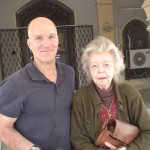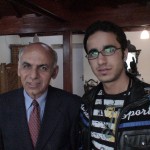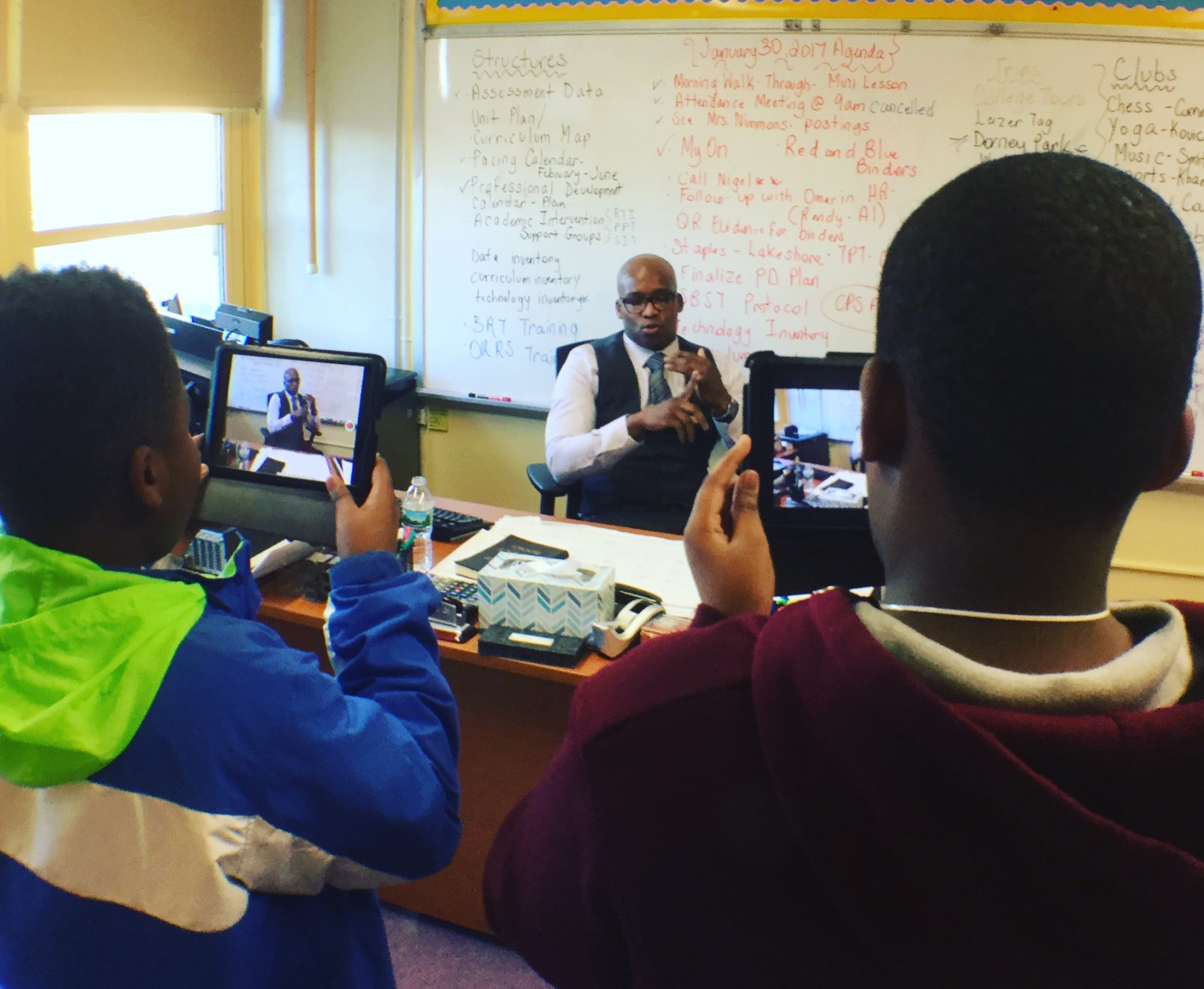I am told to empty the contents of my camera bags on the ground for the German Shepard to sniff. Leila, Nazir and I are ushered to another room. We are searched and walk through a metal detector. They tell us to go outside where the dog sniffs us for explosives.
The Palace guards take my cameras, microphones, batteries, hand cleanser, energy bars and lay them on the ground. They fixate on the tiny Flip camera which is so easy to use but for some reason once I turn it on, I can’t shut it off.
Once they are satisfied it is not a threatening device we collect our things and within 10 minutes and 300 yards, we pass through two more metal detectors, and undergo four body searches. Each time I am searched, the guards pound my shoulders, chest, back, ass, thighs, calves. In the US, that kind of search would cause a revolt. Here, who are you going to tell?
We are finally ushered into the grounds of the Presidential Palace, which looks like walls, chaos and poverty. No trace, here.
We sit in the grand 1st-floor waiting room. Oriental carpets, high ceilings and large windows. The furniture is old and stately. Again, the setting feels very academic. After five minutes an assistant enters the room and tells us, “It’s off.” We will have to reschedule for tomorrow. We can’t, we say. Can we can wait? We say we just need three minutes.
We are moved from the nice white stucco building into the press office in the administrative offices. Three men in dark suits who look to be in their 40’s watch on TV. They look at us blankly as we smile and sit on a couch and watch the wrestling match. Nazir tells me everyone in Afghanistan loves WWE. He rattles off the names of a few stars. He can’t believe I have never heard of the names he mentions, especially since they are “mine” (US). I tell him the only wrestling star I have ever heard of is Cindy Lauper. He doesn’t know who she is. We go back to watching the match.
I think of the numerous 20-foot posters of muscle men I see dangling from buildings around the city. Considering that men and women are encouraged to hide their “form,” images of half-naked muscle men seem a bit peculiar, but I don’t ask. Why go there? Especially in President Karzai’s Press Office.
After two hours of watching TV (at one point we switch tells us President Karzai is too tired and cannot see us. Elmi said he would call us tomorrow and set something up. He also said that his video department could make a tape of President Karzai speaking about Nancy and ACKU, and they could send me the video in the States. He assured me we would speak the next day, Friday, the day of prayer and rest.
A kiss-off, I know, but I am okay with it. At first Leila, Nazir and I are crestfallen, but then we put it in context: we got to visit the Presidential Palace and watch wrestling. Nazir has lived in Kabul his entire life and this was the first Palace visit for him or anyone in his family. It was also nice to be with Nazir and Leila and not feel rushed.
We said goodbye to Nancy earlier in the day, about noon. After another university visit, we met up at the , home to numerous ancient Afghan books, historic photographs, 14th century Korans and other precious documents.
Nancy is with the head of the Archive looking at the books. When the group goes ahead she points to a dark wooden double chair with colored pillows, and whispers, “That’s the chair Louis and I were married on.”
The Archive tour is over. It is time for Nancy to say goodbye. We stand at the portico and take pictures. She apologizes for “all the yelling.” I tell her not to think about it. All is forgiven. I tell her following her has been one of the most extraordinary weeks of my life and thank her for her patience. I don’t tell her, because I know she would bristle at the sentimentality, that meeting her has changed my life. Witnessing how she trudged through the mud to bring one bookshelf and 500 books, so that 800 kids have their first library, will have a lasting effect on me. One seemingly insignificant act, in a rural town without electricity or running water, a town many people would dismiss as beyond hope, now has a library. It will take a lot more than books to sustain these people, but it’s a start.
I ask one of the Afghan guys in our group to take a picture of me, Nancy and Nazir, my trusty translator. The guy takes a picture of me and Nancy. Then I ask Nazir to join us. The guy takes a picture. I ask him to take another, for safety. He does.
Nancy gets in the car and we all line the driveway and wave goodbye as she drives away. Nazir and I retrieve my camera to review the pictures. There is a nice one of me and Nancy. When I advance the view finder, the picture of me, Nancy and Nazir is missing.

“This is crazy,” I say, as I keep looking through the camera.
Nazir shakes his head, and says, “Typical. Afghan.”
“What?” still focused on the camera. “I saw him take the picture. Twice,” I say.
“You don’t understand,” said Nazir, “This is typical Afghan behavior. He was jealous that I was in the photo with you and Nancy-Jan*, and he wasn’t. You see, on top of everything else we have to deal with in Afghanistan, we have to deal with this, jealousy.”
Earlier in the week I took a picture of Nazir with Afghan presidential candidate, Ashraf Ghani. Nazir this one’s for you.
Click here for Day Nine: Delhi in Ten Hours. (Day 8 we took a break).

*Jan is attached to a person’s name for respect. Nancy is called Nancy-Jan by most Afghans

